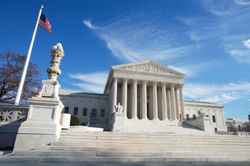 Today, the U.S. Supreme Court (“SCOTUS”) issued its opinion in Koontz v. St. Johns River Water Management District, No. 11-1447, slip op., 570 U.S. ___ (2013). Koontz, a victory for the property owner, is an important property rights case affecting the government’s ability to impose monetary conditions on the approval of land use permits.
Today, the U.S. Supreme Court (“SCOTUS”) issued its opinion in Koontz v. St. Johns River Water Management District, No. 11-1447, slip op., 570 U.S. ___ (2013). Koontz, a victory for the property owner, is an important property rights case affecting the government’s ability to impose monetary conditions on the approval of land use permits.
The case arose when Coy Koontz sought permits to build on approximately four of his nearly 15 acres in Florida, much of which Florida classified as wetlands. Koontz needed special permits from Florida’s water management district (“WMD”) in order to build, which could include conditions to mitigate the impact on the wetlands. When Mr. Koontz applied, he offered to give the WMD a conservation easement over the remaining 11 acres of his property to restrict their development. The WMD, rejecting his offer, gave him two options: (i) reduce the size of his development to one acre and give the WMD a conservation easement over the remaining 14 acres; or (ii) pay the costs of construction improvements, including replacing drainage culverts and filling ditches, to the WMD’s off-site wetlands several miles from Koontz’s property. The WMD denied his permit when Koontz refused these options.
The case involved the application of the “unconstitutional conditions doctrine,” which states that the government cannot force someone to accept an unconstitutional condition in exchange for receiving a government benefit. In the land use context, two SCOTUS cases, Nollan v. California Coastal Commission and Dolan v. City of Tigard, protect a landowner’s right to just compensation under the Fifth Amendment to the U.S. Constitution when the government seeks to impose a condition on issuing a land use permit. Under Nollan and Dolan, the government’s condition must have a “nexus” with the property it affects. This means the condition must be related to the conditions of the property, and it must be “roughly proportional” to the impact of the development on society. If the government’s permit condition fails either of these tests, then the government is required to pay the property owner just compensation.
Koontz answered two questions. First, the Supreme Court held the Nollan and Dolan analysis applies whether the government approves a permit with the unconstitutional condition or denies the permit because an applicant refuses to accept the unconstitutional condition. This holding gives landowners bargaining power, because property owners do not need to accept “extortionist” conditions before they can challenge their validity and seek just compensation. Second, the Supreme Court held that “‘monetary exactions’ must satisfy the nexus and rough proportionality requirements of Nollan and Dolan.” In this sense, monetary exactions from landowners are treated no differently than conditions requiring a landowner to give the government an interest in their land. Unless the requirement to pay money has a nexus with property and is roughly proportional to the development’s expected impacts, the requirement will be found unconstitutional.
What This Means for Virginia Property Owners
For Virginia property owners, Koontz affirms the Virginia Supreme Court’s holdings in Board of Supervisors of James City County v. Rowe, 216 S.E.2d 199 (Va. 1975), Hylton Enterprises, Inc. v. Board of Supervisors of Prince William County, 258 S.E.2d 577 (Va. 1979), and Cupp v. Board of Supervisors of Fairfax County, 318 S.E.2d 407 (Va. 1984).
In Rowe and Cupp, the Virginia Supreme Court found that the county exceeded its authority when it required the landowners to dedicate real property for the construction of roads in exchange for developing their properties. Similarly in Hylton, the Virginia Supreme Court held that Prince William County exceeded its authority when it conditioned the approval of a subdivision plat on the developer paying to construct lanes on two state secondary roads abutting the property. As Koontz reaffirms, neither the Commonwealth nor its political subsidiaries can require a landowner to dedicate property before receiving the benefit of a government action.

